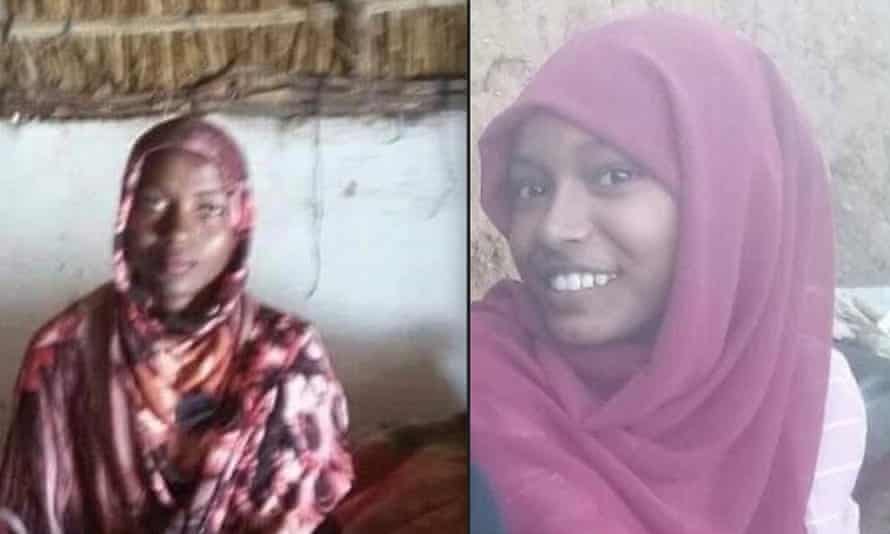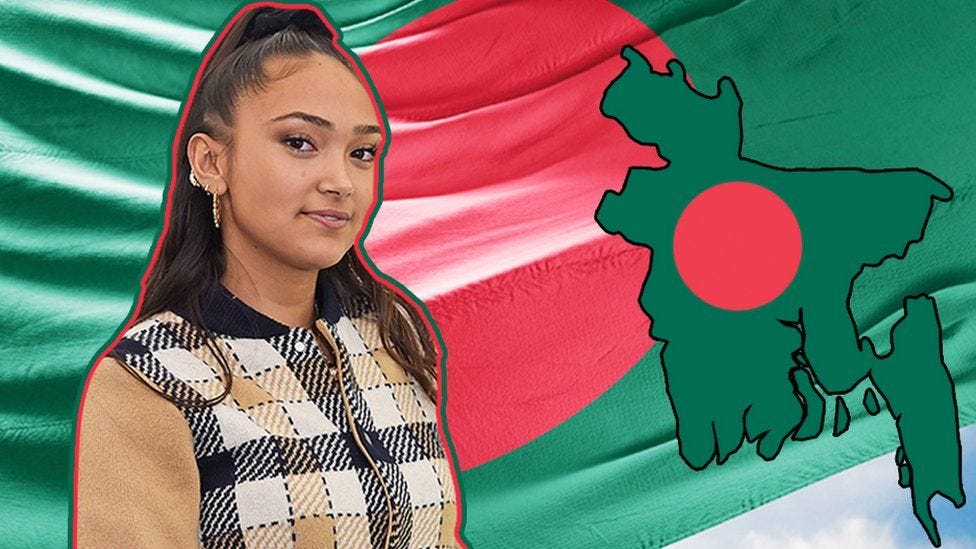Global Roundup: Sudan Gender-based Violence, Migrant Mexican Women Complaint vs USA, Justice for Victims of Czech Sterilization, Islamic School for Trans People in Pakistan, Bangladesh Independence
Compiled by Samiha Hossain
Sajida Omer, left, who was allegedly killed in North Darfur by her father and brother, and Samah el-Hadi, who was allegedly killed by her father in Omdurman via The Guardian
CW: gender-based violence
Earlier this month, a 13-year-old Sudanese girl, Samah el-Hadi, was shot three times and run-over by a car in the city of Omdurman. Her neighbours allege that the father is the perpetrator – however, not only did the authorities not perform a postmortem on Samah’s body, they also released her father after he claimed she took her own life.
Samah’s tragic death and the police’s inaction have led to dozens of women in Sudan sharing their own experiences of domestic violence on social media. There are stories of women being beaten for visiting friends, wearing supposedly unsuitable clothes, and participating in the 2019 protests that overthrew former president Omar al-Bashir.
A week after Samah died and in the same city, a 19-year-old woman was stabbed to death by her husband and buried by her family before the police became involved, according to Kaltoum Fadlallah, a poet and novelist who was among the group of women which handed in the petition of more than 2,000 names to the public prosecutor’s office in Khartoum this week, urging him to reopen the Samah el-Hadi case.
This crime is the clearest and the most ugliest crime against women and children. In order to protect Samah’s rights we want them to reopen the case and re-examine her body and arrest everyone involved. What has happened will put all families under the danger of violence. – Kaltoum Fadlallah, a poet and novelist
People also shared the story of schoolgirl Sajida Omer in North Darfur allegedly murdered by her father and brother for talking to a man at their tomato farm. No one was arrested and she was buried without examination, said Al-Noor Mohamadian, an activist from Kabkabiya, the town where the girl died.
Domestic violence has occurred in 22% of households in Sudan, of which 57% cases include female victims according to Arab Barometer. Domestic violence is also not covered by Sudanese law. Human rights lawyer, Ahmed Sibair, said that crimes against women and girls had increased rapidly since the beginning of the pandemic. He also said that the Sudanese legal system is very lenient towards perpetrators of those crimes.
If 13-year-old girls are not safe in their homes with their families, then where are they safe? It is heartbreaking that so many young Sudanese girls experience violence from their fathers and relatives. The patriarchy continues to protect men at the expense of women and girls. However, the social media outcry and the demands for justice for Samah el-Hadi is indicative of women in Sudan’s refusal to remain silent.
------------------------------------------------------------------------------------------------------
Image via Reuters
A group of Mexican women migrants filed a complaint to the Mexican government accusing the U.S. government of violating a trade agreement by failing to enforce gender discrimination laws in temporary labor programs. The complaint includes women being limited to lower paying jobs and being excluded from the H-2 visa program, which is for temporary seasonal workers in agriculture and other industries. The workers also mentioned how they face sexual harassment in the workplace and and have limited options to take action over it, which violates the United States-Mexico-Canada Agreement (USMCA).
The U.S. has allowed ongoing sex discrimination and gender-based violence against migrant worker women in the guest-worker program. – Rachel Micah-Jones, executive director of the Center for Migrant Rights
Maritza Perez is a 30-year-old woman who said in the complaint that she faced sexual violence and was punished for refusing to have sex with her employer while she was on a H-2A visa picking peppers, squash and cucumber in Florida.
I know of multiple similar cases where workers face discrimination because they are women. I don't want people like my former employer to be able to continue hiring people and turning the American dream into a nightmare. – Maritza Perez
The USMCA trade deal came into effect in 2020 and has a chapter on labor issues – members of the public can submit complaints against any of the governments. Experts say that this complaint is a reminder that the USMCA's labor chapter applies to all three countries. To date, much of the conversation has only been focused on working conditions in Mexico. Now, the Mexican government must decide if they will investigate the women’s complaints and take it to the U.S. government.
Migrant women face racism and misogyny, and on top of that, the burdens of precarious pay, working conditions and status. All of these factors increase their vulnerability to sexual violence and limit the ways in which they can take action against it. It is important that the Mexican government takes these complaints seriously. We must also demand accountability from the government and employers that exploit migrant workers in the U.S. and several other countries.
------------------------------------------------------------------------------------------------------
Radka Hancilova has spent thousands of dollars on treatment following her forced sterilisation in the early 1990s [Courtesy of Radka Hančilová] via Al Jazeera
Czech MPs have finally approved a bill that, if passed through the Senate, would allow victims who were unlawfully sterilized between 1966 and 2012 to apply for compensation of 300,000 Czech crowns ($13,657). However, it is still unclear when the Senate voting will occur.
There are an estimated 7,000 victims of unlawful sterilizations. Women from low-socioeconomic backgrounds and many in the Roma community were sterilized during communist rule in the former Czechoslovakia as part of a state policy. According to activists, the last known case was in 2010. Social workers were encouraged to offer Romani women financial incentives to get sterilized. When that did not work, they were threatened with having their children taken away. There are many stories of women being sterilized without their knowledge and right after giving birth – a time when they are particularly vulnerable and unable to provide informed consent.
In 1994, 20-year-old Radka Hancilova went to the Klaadno Hospital, in central Czech Republic, for a planned Caesarean section. When she woke up after her Caesarean section, the doctor informed her she had been sterilised. It was only after the surgery that hospital staff asked her to sign a consent form.
Reparations would mean a degree of financial and psychological relief, but it will never give back what the doctors did to me. – Radka Hancilova
Elena Gorolova is a 51-year old social worker and activist, and one of the first women to speak openly about her experience with forced sterilization at the age of 21. She was sterilized when she was about to birth her second son and in a lot of pain from the Caesarean section.
It will not undo what had happened to us, but it sends an important message that unlawful sterilisation is done and over with...We fought long and hard for this, but I did not believe for a second that the parliament would give this bill a chance – Elena Gorolova
Reparations are the minimum the state can do for violating the bodies and autonomy of so many people. The trauma of this inhumane procedure likely creates long lasting ripples across generations. Activists have fought long and hard for reparations and are optimistic that they are close to receiving some semblance of justice.
------------------------------------------------------------------------------------------------------
Rani Khan, a transgender woman who teaches the Koran at Pakistan's first transgender only madrasa or a religious school, looks at one of her students during a tailoring lesson in Islamabad, Pakistan March 10, 2021. Picture taken March 10, 2021. REUTERS/Salahuddin
Khan was disowned by her family at 13-years-old and had to resort to begging, as well as dancing at weddings and other functions. A deceased friend inspired her to open the school as a way to do something for their community.
Most families do not accept transgender people. They throw them out of their homes…I’m teaching the Koran to please God, to make my life here and in the hereafter - Rani Khan
The Pakistani government has opened several public schools for trans people, however, this is the first school for trans people where the education is explicitly religious. Khan will also teach students to sew and embroider, so they can sell clothes to raise funds for the school. She says that some officials have also offered to help students find employment.
Pakistan is one of many formerly colonized countries with anti-homosexuality laws. However, in 2018, the country passed the Transgender Persons (Protection of Rights) Act, which allows people to choose their genders on official legal documents, and prohibits discrimination in spheres of public life such as school, work and public transit. Nonetheless, violence against trans people is prominent, particularly via sexual assault and gun violence.
Khan’s school contributes to the growing communities trans people have created for their peers to support each other in a society that ostracizes and devalues them. As trans people continue to build these communities, they are making it clear that they will take up space and fight against transphobia, homophobia, misogyny and the patriarchy.
------------------------------------------------------------------------------------------------------
Getty Images
The war made us a matriarchy because a lot of the men in our family passed away. And I feel incredibly grateful to be alive, to be able to use my voice and music to tell that story. – Joy Crookes
Crookes gave her first-ever live performance in Bengali to celebrate Bangladesh’s 50th year of independence. She considers it a huge achievement, as she has spent a lot of time learning the language. As a Bangladeshi woman artist in the West, she hopes to inspire others.
When a country fights for its independence, it's not only fighting for its people, but for its art, music, storytelling, poems, and voice. – Joy Crookes
Crookes draws from her own personality and her Bangladeshi and Irish cultures when it comes to storytelling through her music.
The Bengali language lends itself so beautifully to telling stories, to creating a scene or an exaggeration of the story sometimes. Particularly how aunties tell stories. – Joy Crookes
For her, speaking her mind is particularly meaningful because of how hard her family and others in Bangladesh had to fight. Growing up, she was ridiculed for how she dressed, the traditional music she listened to and supposedly smelling like curry. However, at the Brit Awards last year, she decided to wear a traditional lehenga dress, not only for representation, but to also say that she belongs. She recognizes that her actions are nothing compared to the risks her family took to become Bangladeshi, but she hopes it helps people like her feel more confident.
Joy Crookes’ art as well as her connection to her maternal land is inspiring. Today is an important day to reflect on all the women who fought for Bangladesh’s liberation, the sacrifices they made and the violence they were subjected to.
—————————————————————————————————————-
Samiha Hossain (she/her) is a student at the University of Ottawa. She has experience working with survivors of sexual violence in her community, as well as conducting research on gender-based violence. A lot of her time is spent learning about and critically engaging with intersectional feminism, transformative justice and disability justice.
Samiha firmly believes in the power of connecting with people and listening to their stories to create solidarity and heal as a community. She refuses to let anyone thwart her imagination when it comes to envisioning a radically different future full of care webs, nurturance and collective liberation.




![Radka Hancilova has spent thousands of dollars on treatment following her forced sterilisation in the early 1990s [Courtesy of Radka Hančilová] Radka Hancilova has spent thousands of dollars on treatment following her forced sterilisation in the early 1990s [Courtesy of Radka Hančilová]](https://substackcdn.com/image/fetch/$s_!JFa3!,w_1456,c_limit,f_auto,q_auto:good,fl_progressive:steep/https%3A%2F%2Fbucketeer-e05bbc84-baa3-437e-9518-adb32be77984.s3.amazonaws.com%2Fpublic%2Fimages%2F3edafc1f-cfa8-4722-92d1-e72959b750cf_770x513.jpeg)

